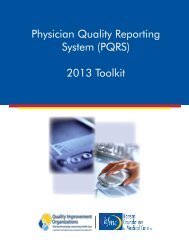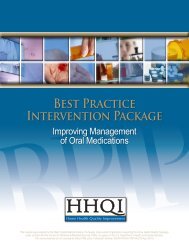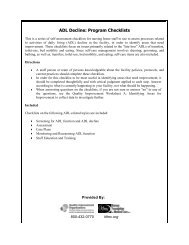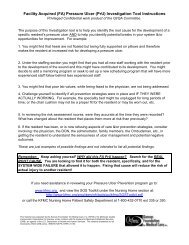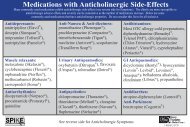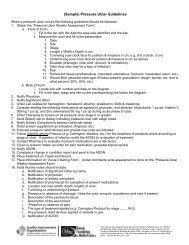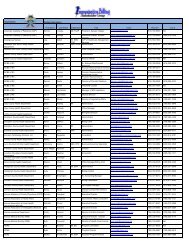Best Practice Intervention Package - Kansas Foundation for Medical ...
Best Practice Intervention Package - Kansas Foundation for Medical ...
Best Practice Intervention Package - Kansas Foundation for Medical ...
- No tags were found...
Create successful ePaper yourself
Turn your PDF publications into a flip-book with our unique Google optimized e-Paper software.
DIABETESCenters <strong>for</strong> Disease Control and Prevention (CDC) recently announced thatnearly 26 million Americans have diabetesand an estimated 79 million U.S. adultshave prediabetes. Dr. Albright, director ofCDC’s Division of Diabetes Translation,states that “these distressing numbersshow how important it is to prevent type 2diabetes and to help those who havediabetes manage the disease toprevent serious complications suchas kidney failure and blindness”. Thein<strong>for</strong>mation below describes strategies <strong>for</strong>promoting better management ofdiabetes.The AADE7 Self-Care Behaviors <strong>for</strong>diabetes are:• Healthy eating• Being active• Monitoring• Taking medication• Problem solving• Healthy coping• Reducing risksMore in<strong>for</strong>mation on the AADE7 selfcarebehaviors click here.“Diabetes education, also known as diabetes self-management training (DSMT)or diabetes self-management education (DSME), is defined as a collaborativeprocess through which people with or at risk <strong>for</strong> diabetes gain the knowledge andskills needed to modify behavior and successfully self-manage the disease and itsrelated conditions. DSMT/DSME is an interactive, ongoing process involving theperson with diabetes (or the caregiver or family) and a diabetes educator(s). Theintervention aims to achieve optimal health status, better quality of life andreduce the need <strong>for</strong> costly health care” (American Association of DiabetesEducators --AADE).The ADE7 TM self-care behaviors are listed in the box above.Patient resources, which include a self-management plan <strong>for</strong> each behavior, areavailable <strong>for</strong> each of the behaviors at this link.Franz, et al., (2010) reviews the evidence and nutrition practicerecommendations presented in the American Dietetic Association Nutrition<strong>Practice</strong> Guidelines <strong>for</strong> Type 1 and Type 2 Diabetics in Adults. The article shares29 key nutrition practice guidelines to support diabetics. This includes therecommendations on assessing patient needs, selecting interventions, andmonitoring and evaluating outcomes. The evidence supports medical nutritiontherapy provided by a registered dietitian (RD). Some of the keyrecommendations include:• Consistency in day-to-day carbohydrate intake <strong>for</strong> persons with type 2diabetes• Adjusting insulin dose to match carbohydrate intake <strong>for</strong> persons with type1 diabetes• Focusing on total carbohydrate intake rather than the type of carbohydrate• Cardio protective nutrition interventions• Weight management strategies• Regular physical activity• Use of self glucose monitoring data to determine if goals are being met- 15 -



